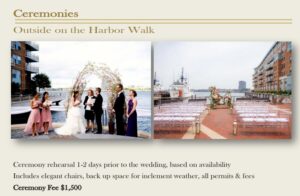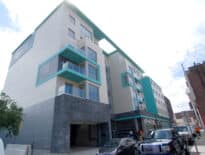Is there anyone who objects to weddings at Boston’s Battery Wharf Hotel?
Conservation Law Foundation isn’t holding its peace, speaking now about a series of alleged public access violations.
The 150-room hotel has been charging $1,500 for wedding ceremonies on the Boston Harborwalk, installed an outdoor bar called the Battery Wharf Grille on public open space and closed off public balconies and historic exhibit space for private functions, according to Boston-based CLF.
In a Sept. 10 letter to Martin Suuberg, commissioner of the state Department of Environmental Protection, CLF cited seven separate violations of the hotel’s waterways license. The document, issued in 1999, spells out required compliance with the state’s Chapter 91 law governing waterfront development on public tidelands.
CLF documented “numerous and significant” license violations on a Sept. 3 site visit, according to Deanna Moran, CLF’s director of environmental planning.
The hotel has closed public areas, including the Boston HarborWalk, 21 times in the past year for private revenue-generating events such as weddings and corporate events, CLF said.
“This license is legally binding and the public access it requires is non-negotiable,” Moran wrote. “As explained below, the licensee is regularly restricting access to public areas of the site for private functions and events for its own financial gain, a practice which not only directly violates the conditions of its license and the waterways regulations, 310 CMR 9.00, but is also antithetical to the underlying purposes of the Public Waterfront Act.”
The Coast Guard museum is “routinely used for daytime private events,” CLF said.
CLF is seeking DEP order to remedy the violations and fine the hotel.
On its website, the hotel continues to advertise a $1,500 wedding package, including a Harborwalk ceremony. Contacted by Banker & Tradesman on Friday, hotel General Manager Nicholas Teeson said the hotel’s attorney was preparing a response for CLF’s letter. Attempts to reach the attorney were unsuccessful.
Under the 1999 license, the original developer, Raymond Property Co., agreed to provide 1.8 acres of public open space and a water taxi waiting area, to maintain a 1,000-square-foot U.S. Coast Guard Museum exhibit on the first floor of one building from 8 a.m. to 9 p.m. and a 1,300-square-foot observation balcony that is open 24 hours a day.
CLF spotlighted similar violations at the Intercontinental Hotel in 2017, which opened an outdoor bar on a portion of the Harborwalk. After the DEP issued a certificate of noncompliance, the hotel agreed to relocate its Five-10 Waterfront bar away from the Harborwalk, where it had been charging up to $2,000 for private events.
In last week’s letter, Moran suggested that financial penalties are required to discourage private property owners from disregarding Chapter 91.
“If the licensee is not required to compensate the public for its years of non-compliance, there is no real incentive for it or any other waterways license holder to comply with license conditions that safeguard public rights and interests in tidelands unless and until they are forced to do so by DEP,” Moran wrote. “In fact, license holders may actually have incentive to wait to comply with such conditions until DEP forces them to, knowing that they can gain the economic advantages of doing so without risk of penalty.”
Toronto-based Westmont Hospitality Group and Thomas Tan of Bestford Hospitality Group acquired the property in 2015 for $48.6 million.




 |
| 




